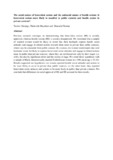Please use this identifier to cite or link to this item:
https://cris.library.msu.ac.zw//handle/11408/3579Full metadata record
| DC Field | Value | Language |
|---|---|---|
| dc.contributor.author | Chisango, Tadios | - |
| dc.contributor.author | Mayekiso, Thokozile | - |
| dc.contributor.author | Thomae, M. | - |
| dc.date.accessioned | 2019-04-29T08:15:12Z | - |
| dc.date.available | 2019-04-29T08:15:12Z | - |
| dc.date.issued | 2014 | - |
| dc.identifier.issn | 0020-7594 | - |
| dc.identifier.uri | https://onlinelibrary.wiley.com/doi/pdf/10.1002/ijop.12106 | - |
| dc.identifier.uri | https://www.ncbi.nlm.nih.gov/pubmed/25303091 | - |
| dc.identifier.uri | http://hdl.handle.net/11408/3579 | - |
| dc.description.abstract | Previous research converges on demonstrating that benevolent sexism (BS) is socially approved, whereas hostile sexism (HS) is socially disapproved. We postulated that a sample of married women would be likely to report that their husbands express hostile sexist attitudes and engage in related actions towards them more in private than public contexts, where they lie concealed from public censure. By contrast, the women would report that their husbands would be likely to express benevolent sexist attitudes and engage in related actions more in public than private contexts, where they are reinforced not only by their target (i.e. wife), but also by significant others and the society at large. We tested these hypotheses with a sample of Black, heterosexually married Zimbabwean women (n = 109, mean age = 31.83). Results supported our hypotheses: the women reported hostile sexist attitudes and actions to be more likely to occur in private than public contexts; on the other hand, they reported benevolent sexist attitudes and actions to be more likely in public than private contexts. We conclude that differences in social approval of BS and HS account for these results. | en_US |
| dc.language.iso | en | en_US |
| dc.publisher | Wiley | en_US |
| dc.relation.ispartofseries | International Journal of Psychology;Vol. 50; No. 5: p. 363-371 | - |
| dc.subject | Benevolent sexism | en_US |
| dc.title | The social nature of benevolent sexism and the antisocial nature of hostile sexism: Is benevolent sexism more likely to manifest in public contexts and hostile sexism in private contexts? | en_US |
| dc.type | Article | en_US |
| item.openairetype | Article | - |
| item.languageiso639-1 | en | - |
| item.openairecristype | http://purl.org/coar/resource_type/c_18cf | - |
| item.cerifentitytype | Publications | - |
| item.grantfulltext | open | - |
| item.fulltext | With Fulltext | - |
| Appears in Collections: | Research Papers | |
Files in This Item:
| File | Description | Size | Format | |
|---|---|---|---|---|
| The social nature of benevolent sexism and the antisocial nature of hostile sexism.pdf | Abstract | 5.16 kB | Adobe PDF |  View/Open |
Items in MSUIR are protected by copyright, with all rights reserved, unless otherwise indicated.



